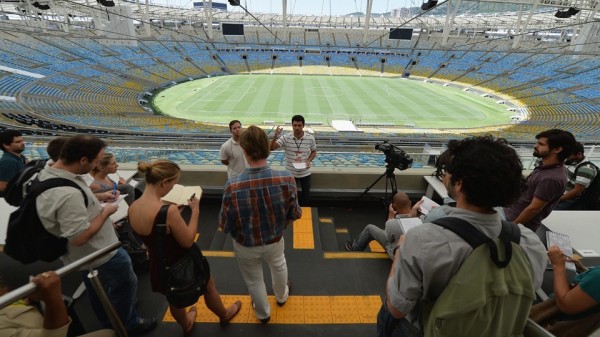This harvest season in Brazil, which produces an astounding one third of the world’s coffee, expect the industry to face some serious disruptions from an unstoppable force of nature: The FIFA World Cup.
The 2014 Cup comes to 12 venues in football-crazy Brazil right in the heart of the typically three-month harvest season, with matches running from early June into July. In this case work and play may be irreconcilable. In a recent Wall Street Journal story, some sources in Brazil urge outsiders traveling to origin to make special considerations this year:
“In Brazil, World Cup means a national holiday, so every day we have a Brazilian match going on, that’s a national holiday,” said Henrique Sloper de Araújo, vice president of the Brazilian Specialty Coffee Association and a farmer in the state of Espírito Santo.
Some traders are advising clients to avoid farm visits during the World Cup, fearing high airfares, traffic jams and other hassles as the world’s soccer fans converge on Brazil. Those trips by roasters to what’s known in the industry as “origin” are key business-building opportunities. Many workers will probably get time off to watch Brazil play, though it’s too soon to tell whether that alone will delay the harvest or shipments.
There is tremendous pressure on Brazil to finish completing its World Cup venues, and the pressure on the coffee industry may run high, too, especially as recent dry weather has weakened expectations for this harvest season.
This is the first time the World Cup has been played in a coffee-producing country since the 1986 Cup in Mexico, which incidentally was a time that ININMECAFE, the Mexican government coffee agency, began to decline in power, defaulting in its support of small farmers before folding in 1989. Ironically, the Mexican coffee industry at the time was also hit hard by huge harvests of cheap coffee from Brazil that permanently altered the global marketplace.
Nick Brown
Nick Brown is the editor of Daily Coffee News by Roast Magazine.
Comment
2 Comments
Comments are closed.







This is the first time the World Cup has been played in a coffee-producing country since the 1986 Cup in Mexico, which incidentally was a time that ININMECAFE, the Mexican government coffee agency, began to decline in power, defaulting in its support of small farmers before folding in 1989.
Read more at v9bet
Those trips by roasters to what’s known in the industry as “origin” are key business-building opportunities. Many workers will probably get time off to watch Brazil play, though it’s too soon to tell whether that alone will delay the harvest or shipments. https://thammyxinh.vn/cach-tim-truong-day-hoc-cham-soc-da-chuyen-nghiep/